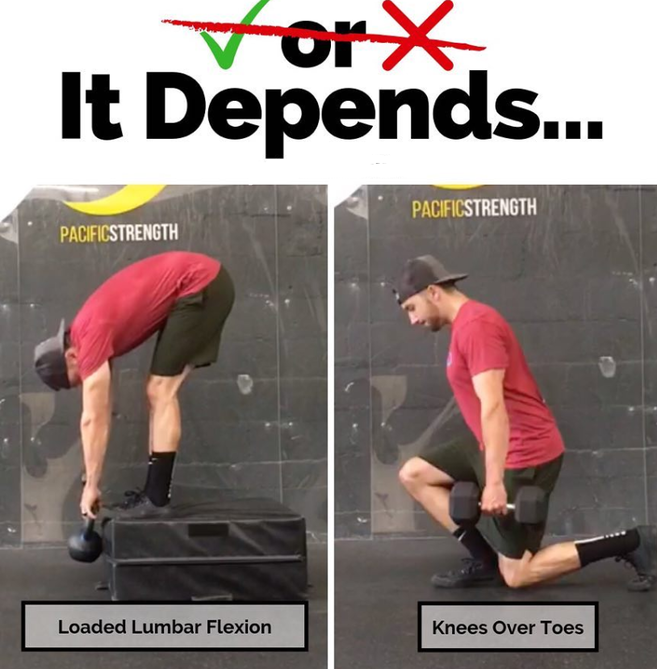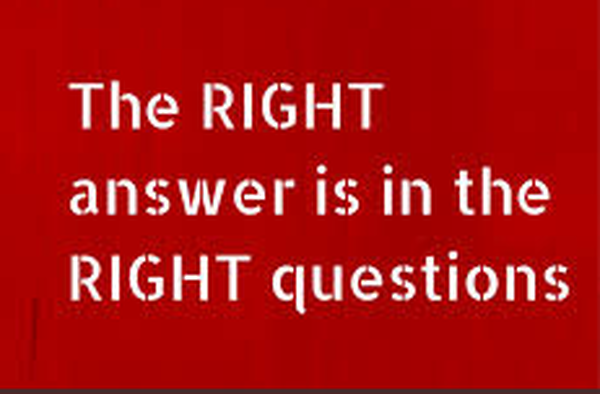"It depends."
Don’t you just hate hearing that as an answer to your question?
You’re there thinking about a question you’re wanting to ask, and when you finally articulate what you’re wanting to say, the brilliant insight and information you’re expecting is nothing but a lame and disappointing answer like “it depends.”
As a strength coach and nutrition adviser, I probably like responding to questions I’m asked with “it depends” as much as you like hearing it.
But the truth of the matter is, it really does depend. Everything depends on something in this game.
Sometimes I wish there were easy, one size-fits all type answers for the questions I’m asked daily about training and nutrition.
Questions like:
How many calories do you have to eat to lose weight?
Which foods are bad?
Which foods are healthy?
What type of workouts should I do?
When’s the best time to eat?
What’s the best number of reps to do?
How long until I see results?
And literally hundreds more of those type of questions.
As you may have inferred, all of these questions are going to be answered with a “well, it depends,” and I hope you can see why.
With such open ended questions and little information provided along with the question, it’s almost impossible to provide an accurate answer for the unique individual asking the question.
Now the beauty of the “it depends” answer doesn’t come with the answer alone (because it’s such a deflating thing to hear initially), but the information that comes along after.
If you’re truly looking for accurate information, and not some half-assed response to make you feel good or satisfy your quest for info temporarily, your questions about training and nutrition should always be followed up with some questions from the person you are asking.
If you ask a trainer or coach a question about your OWN UNIQUE nutrition and training and you’re met with a cookie cutter simple one sentence answer, then turn around and walk away.
There is no way this person knows enough information about you in a single question like “what’s the best workout for me” to form an accurate response.
Your best answer would be, yup you guessed it: IT DEPENDS.
Before you ask these questions, or any question like them, take a short inventory of yourself and where you are in your own personal fitness journey.
Are you an advanced lifter, or someone just starting out?
Do you have 40 pounds to lose, or 2 pounds to lose?
Are you looking to build muscle, or burn fat?
Take any and all information you know about yourself and use it to build context for the question.
An easy example for the “how many calories to lose weight” question would be something along the lines of:
“I’m a 30 year old male who exercises 3 times a week. I’ve only been training for a few months. I currently weight 210 pounds and would like to lose 30 pounds through diet and weight training. This is what I’m currently eating right now (insert your usual diet) HOW MANY CALORIES SHOULD I BE EATING EACH DAY TO LOSE WEIGHT?
Providing such a little bit more information about yourself can allow the person you're asking to give you a hell of a lot more useful information.
We've all got questions, and we all want helpful, useful answers.
So ff you’re looking for the right answers, just remember that they’re going to come from asking the right questions.
You’re there thinking about a question you’re wanting to ask, and when you finally articulate what you’re wanting to say, the brilliant insight and information you’re expecting is nothing but a lame and disappointing answer like “it depends.”
As a strength coach and nutrition adviser, I probably like responding to questions I’m asked with “it depends” as much as you like hearing it.
But the truth of the matter is, it really does depend. Everything depends on something in this game.
Sometimes I wish there were easy, one size-fits all type answers for the questions I’m asked daily about training and nutrition.
Questions like:
How many calories do you have to eat to lose weight?
Which foods are bad?
Which foods are healthy?
What type of workouts should I do?
When’s the best time to eat?
What’s the best number of reps to do?
How long until I see results?
And literally hundreds more of those type of questions.
As you may have inferred, all of these questions are going to be answered with a “well, it depends,” and I hope you can see why.
With such open ended questions and little information provided along with the question, it’s almost impossible to provide an accurate answer for the unique individual asking the question.
Now the beauty of the “it depends” answer doesn’t come with the answer alone (because it’s such a deflating thing to hear initially), but the information that comes along after.
If you’re truly looking for accurate information, and not some half-assed response to make you feel good or satisfy your quest for info temporarily, your questions about training and nutrition should always be followed up with some questions from the person you are asking.
If you ask a trainer or coach a question about your OWN UNIQUE nutrition and training and you’re met with a cookie cutter simple one sentence answer, then turn around and walk away.
There is no way this person knows enough information about you in a single question like “what’s the best workout for me” to form an accurate response.
Your best answer would be, yup you guessed it: IT DEPENDS.
Before you ask these questions, or any question like them, take a short inventory of yourself and where you are in your own personal fitness journey.
Are you an advanced lifter, or someone just starting out?
Do you have 40 pounds to lose, or 2 pounds to lose?
Are you looking to build muscle, or burn fat?
Take any and all information you know about yourself and use it to build context for the question.
An easy example for the “how many calories to lose weight” question would be something along the lines of:
“I’m a 30 year old male who exercises 3 times a week. I’ve only been training for a few months. I currently weight 210 pounds and would like to lose 30 pounds through diet and weight training. This is what I’m currently eating right now (insert your usual diet) HOW MANY CALORIES SHOULD I BE EATING EACH DAY TO LOSE WEIGHT?
Providing such a little bit more information about yourself can allow the person you're asking to give you a hell of a lot more useful information.
We've all got questions, and we all want helpful, useful answers.
So ff you’re looking for the right answers, just remember that they’re going to come from asking the right questions.


